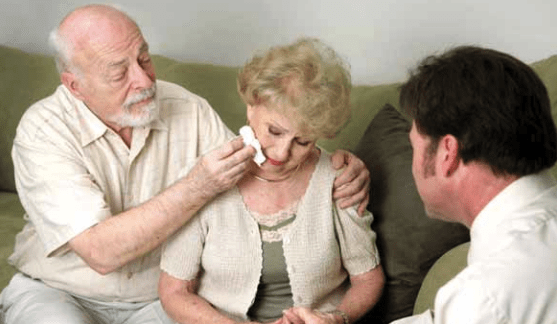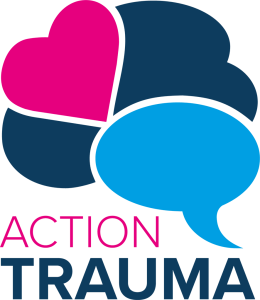Alcohol, drugs and older people

This leaflet is for older people (defined as those aged 55 or over) who are worried about their use of alcohol, illegal drugs and/or prescribed/over-the-counter medications. It is also for their family members, carers or friends, and for health professionals who want to know more about older people and their use of alcohol and/or drugs.
Why is this leaflet needed?
Some older people use and misuse alcohol. They also smoke cigarettes, misuse prescribed medications, buy over-the-counter medication and are increasingly using illicit drugs. As people get older the impact of these substances on physical and mental health increases. This can become a problem. Among older people this problem is often hidden. This leaflet has been written to enable older people, family members and/or carers to feel confident enough to voice any concerns about alcohol and/or drugs, and to ask for help. Health professionals are encouraged to raise concerns with older people and provide support where it is needed.

Older people and alcohol and drug misuse – a hidden problem
Substance misuse is a hidden problem for many older people. Health and social care professionals may not always spot heavy drinking or drug misuse in older people as:
- Some older people tend not to talk about drinking, perhaps due to a perception of shame, stigma or embarrassment;
- The effects of alcohol or drug misuse are sometimes mistaken for a physical or mental health problem;
- Older people are often not asked questions about alcohol or drug use as they are assumed not to be a problem.

What are the effects of alcohol or drug problems?
Misuse of alcohol and drugs can affect physical and mental health and increase the risk of developing problems or conditions in later life. These include:
- Increased risk of accidents;
- Increased risk of hypothermia;
- Increased risk of stroke and heart disease;
- Increased risk of cancer;
- Poor liver functioning;
- Poor coordination/balance;
- Incontinence;
- Depression;
- Dementia;
- Anxiety;
- Confusion;
- Memory impairment;
- Decreased ability to respond to emergency situations (eg smoke alarms).
Impact on family members
Drinking or drug misuse by an older person may have an impact on the wider family, causing anxiety and stress and sometimes leading to relationship breakdowns. Some people find that their drinking or drug use means they don’t see family members as much as they used to.

For family members of an older person with an alcohol or drug problem, they can find things difficult and feel they need support in their own right to help to cope with the situation. Family members can talk to their doctor or look for a support service.
Can older people address an alcohol or drug problem? Many older people are motivated to change their drinking or drug use so that they can have more contact with their families, particularly grandchildren. Health professionals have found that it is often easier to treat alcohol and drug problems in older people than in younger adults. An older person who thinks they have an alcohol or drug problem should talk to their doctor. There are treatment options available, which may include counselling or support groups. Getting involved with activities in the local community, making links with services, taking up hobbies and making contact with family members and friends are important for older people who have become isolated.
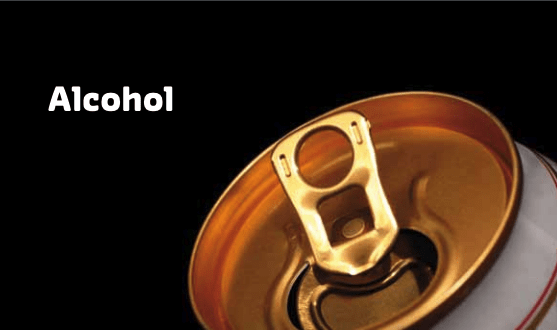
Does alcohol affect people differently as they get older?
As people get older, their bodies change. Alcohol is broken down more slowly, and they become more sensitive to the effects of alcohol. Therefore, if people continue to drink the same amount of alcohol, as they get older, it is likely to affect them more. It is important for people as they get older to be aware of how much they are drinking and perhaps to drink less.
How much is safe to drink?
Women are advised to drink no more than 2–3 units a day and men no more than 3–4 units a day. In some circumstances a doctor may recommend reducing the amount of alcohol taken or not drinking at all. It is important to follow such advice.
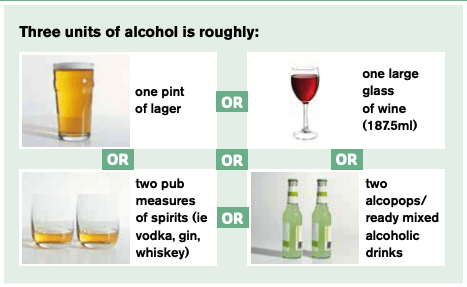
The damage caused by alcohol increases with the amount consumed. There are also weekly ‘sensible’ levels of drinking which should reduce the likelihood of alcohol intake causing harm. Note that drinking at the top end of the daily recommended limit every day adds up to more than weekly sensible limits.
These are:
14 units of alcohol a week for women
- Roughly one and a half 750ml bottles of wine at 13% strength or
- Seven pints of beer/lager at 4% strength or
- Seven pub measures (35ml each) of spirits 21 units of alcohol a week for men
- Roughly two and a third 750ml bottles of wine at 13% strength or
- 10 pints of beer or lager at 4% strength or
- 11 pub measures (35ml each) of spirits

However, some bodies such as the Institute of Alcohol Studies and the Royal College of Psychiatrists have noted that safer drinking levels for older people could actually be less than the recommended weekly or daily limits given that they break down alcohol more slowly than when they were
younger.
It is also important to remember that the measures people pour themselves at home, or which friends and family pour, are often a lot more generous than the standard pub measures! Are there any risks with ‘sensible’ drinking for older people? Alcohol can interfere with the effect of some medicines. Check with your doctor whether or not you can drink alcohol with your particular health problems or medication.

Can an older person develop an alcohol problem?
Yes – about a third of older people with drinking problems develop them for the first time in later life. Bereavement, physical ill-health, becoming a carer, loneliness, difficulty getting around and social isolation can lead to unhappiness and depression. No longer working, changes in routine, financial, housing and other circumstances can lead to an increase in drinking or misuse of drugs (including over-the-counter and prescribed medication).
Older people can become socially isolated in many ways, including loss of contact with their family, loss of a partner due to bereavement, loss of mobility, less contact with friends and less involvement with activities in their communities.
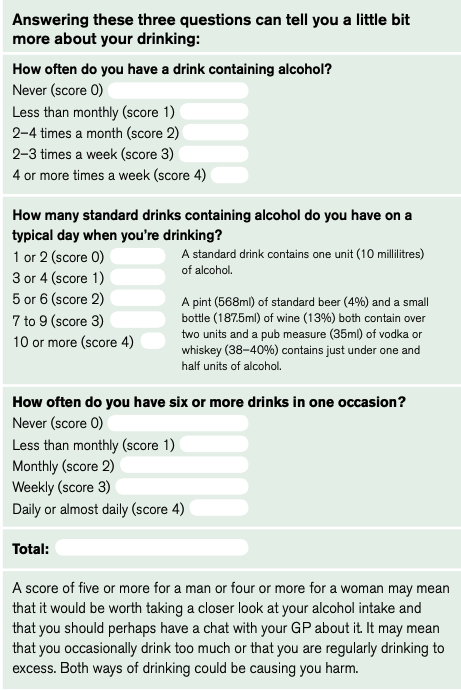

Drug misuse and older people
Drug misuse among older people tends to involve misuse of over-the-counter medicines, bought in shops and pharmacies and prescription medication. These include painkillers, sleeping tablets, medicines for the treatment of anxiety, depression and other conditions. Reducing misuse of medicines should be discussed with a doctor, who can offer advice and sources of support. Some older people use illegal drugs such as cannabis, cocaine, heroin and amphetamines. Reducing or stopping use of these drugs should also be discussed with a doctor. Prescribed medication – questions to ask the doctor It is important for patients to ask the doctor about the medication they have been prescribed, or to take someone with them (family member, carer or friend) to help them understand why a certain drug has been prescribed. It is important to read the patient information leaflet that comes (usually inside the box) with any prescribed or over-the-counter medication. Questions you should ask include:
- Why am I getting this drug and what does it do?
- How, when and for how long will I have to take it?

Will it interfere with any of the other medications I am taking?
- Will it cure my condition or is it just to give me relief from my symptoms?
- What are the possible side effects – are they minor or major,
common or rare? - Do the benefits outweigh the risks?
- What are my non-drug alternatives, ie are there any lifestyle changes I
can make which will help address my condition or relieve my symptoms
or are there any alternative therapies or treatments I could try?
Prescribed/over-the-counter drugs and alcohol
It is important that people are always open and honest with their doctor/ health professional about the medication that they are taking (both prescribed and over the counter) and about their alcohol intake as
mixing medicines and alcohol can be extremely harmful. Older people are particularly at risk as ageing slows the body’s ability to break down alcohol, so it remains in a person’s system longer. Older people also are more likely to take medication that is known to interact with alcohol.
Alcohol, drugs and older people – myths and reality A number of myths exist about older people and alcohol and drug use.

Myth: older people don’t experience substance-related problems According to The Royal College of Psychiatrists, one in six older men and one in 15 older women are “…drinking enough to harm themselves.” Furthermore, approximately one-third of all prescribed drugs such as anti-depressants and painkillers are used by people aged over 65. Older people can misuse prescribed medication in a number of ways such as by using a higher dose than directed, using for a longer time period than
recommended, taking alcohol along with prescribed medication and by borrowing medication that has not been prescribed by their GP for their own personal use. Also, as with their younger counterparts, older people (especially those in the younger age bracket of older age) may also use illegal drugs.
Myth: alcohol helps you sleep Alcohol disrupts normal sleep patterns and too much alcohol can result in wakening during the night.
Myth: the only older people at risk of developing alcohol-related
problems are those who have been drinking heavily since their
twenties or thirties.
The ‘late onset’ group, which makes up about a third of older people with alcohol problems, developed the problem after the age of 50; contributory factors can include bereavement, retirement, social isolation and mental or physical health problems. Older people who drink occasionally but who sometimes, or often, drink to excess are also at risk of developing alcohol-related problems.
Myth: why talk to an older person about their drinking – isn’t it
their only pleasure in life?
Older people have the same right to access health-related information as younger people. Many older people would like to reduce their drinking or drug use, but haven’t been presented with the opportunity. Would it be acceptable to think this about a younger person’s drinking or drug use?
Older people who have problems with alcohol and/or drugs can be treated effectively – they can recover and maintain an improved quality of life. Simply by asking older people about their use and assessing it against the recommended levels for sensible drinking and/or the medication they are using, health professionals are best placed to assist an older person in making positive changes that will ultimately improve their short-term and long-term health.
Myth: older people can’t change their behaviour at their age
Research shows that older people are just as capable of changing their behaviour as any other age group. Many older people have not only addressed their alcohol or drug problem but have also made positive changes in other areas of their lives, eg health, family relationships, social contacts by reducing or stopping their use/misuse of alcohol and/ or drugs.


Sources of help, support and information
If you are concerned about your drinking, drug use, or use of prescribed/ over-the-counter medication, you should first talk to your GP who will be able to advise you how to cut down or stop your use of alcohol and/ or drugs. If your GP feels that you need help in addressing your alcohol and/or drug use they will be able to refer you on to a specialist service either in the statutory or community setting.
Addiction NI – Older Focus
Addiction NI is a community/voluntary organisation which specialises in providing support to older people with an alcohol and/or drug misuse problem, and they are located across Northern Ireland. Addiction NI can provide support at their local office base, in your own home or indeed over the telephone if you prefer. They can also provide advice and support to concerned family members, carers and other organisations who provide services and support to older people who may have concerns.
www.addictionni.com
Email: enquiries@addictionni.com
Tel: 028 9066 4434 (This is the number for their head office in Belfast which will be able to provide you with contact information for the local Older Focus service)

Directories of drug and alcohol services including what age range they cater for, what support they can offer and how to access them are available for each Health and Social Care Trust area (Belfast, Northern, Southern, South Eastern and Western) from the ‘Publications’ section of the Public Health Agency’s website: www.publichealth.hscni.net For more information on alcohol go to: www.knowyourlimits.info For information on maintaining good mental health go to www.mindingyourhead.info If you are in distress or despair, contact Lifeline, a free and confidential
24-hour helpline service on 0808 808 8000 who can also direct you on to appropriate services.
